Monuments, Memorials and Museums in Monroe Michigan
Monroe County is a county in the U.S. state of Michigan. As of the 2020 Census, the population was 154,809. The largest city and county seat is Monroe. The county was established as the second county (after Wayne County) in the Michigan Territory in 1817 and was named for then-President James Monroe. Monroe County features a lot of attraction sites for entertainment, relaxation, sightseeing and shopping. These attraction sites include monuments, museums, and memorial sites, some of which are discussed below.
Monroe County Michigan Historical Museum
Monroe County Museum, housed in the Old Courthouse, maintains and operates four historic sites in Monroe County that collectively interpret the area’s rich history, ranging from the pioneer life, politics and literary legacies of Monroeville’s two most famous writers, Truman Capote and Harper Lee. The four historical sites are the Old Courthouse Museum, the Rikard’s Mill Historical Park, the Capote Marker/ Faulk Fence, and the Old Bethany’s Baptist Church.
Old Courthouse Museum
Restored to its 1930s appearance, the old courtroom museum is the model for Harper Lee’s fictional courtroom settings in To Kill a Mockingbird. The museum houses two permanent exhibits: Truman Capote: A Childhood in Monroeville, and Harper Lee: In Her Own Words. Each April and May, the courtroom is the setting for the second act of the Mockingbird Players’ acclaimed production of To Kill a Mockingbird.
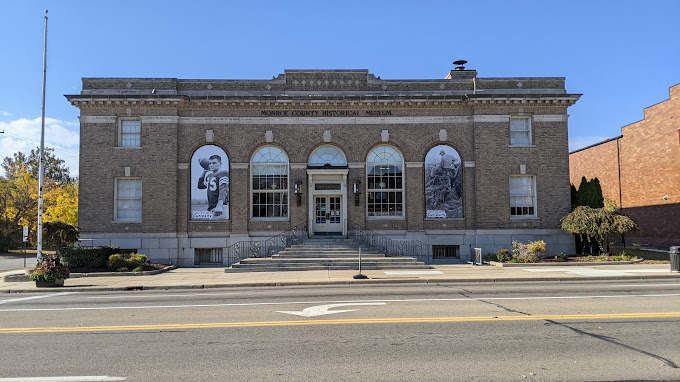
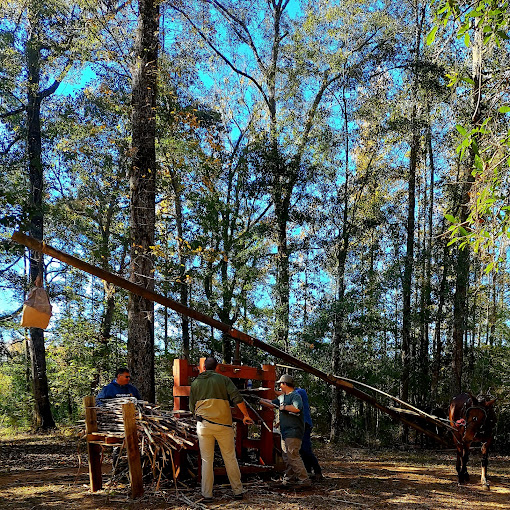
Rikard’s Mill Historical Park
Rikard’s Mill is home to a fully functioning water-powered grist mill and museum. Nestled in the piney woods along the banks of the picturesque Flat Creek, the mill has served residents of north Monroe County since it was built in 1845. The museum is dedicated to preserving past folk traditions, such as gristmilling, blacksmithing and cane syrup making, by holding many interactive events in the park each year.
Capote Marker/ Faulk Fence
Although the home on South Alabama Avenue where Truman Capote spent his childhood burned in 1940, portions of the rock fence and foundation remain, and an Alabama historic marker guides visitors to the spot. The Monroe County Museum maintains the site, and there are still camellias thriving on the lot planted by Truman’s cousins Sook and Jenny Faulk.
Old Bethany’s Baptist Church
Bethany Baptist Church was built in 1874 and sits along the Old Federal Road in one of Monroe County’s most picturesque and historic communities — Burnt Corn. Today its old post office, country store, houses, churches and doctor’s office appear frozen in time and are maintained by the J.F.B. Lowrey Trust.
There’s also a Bird’s Nest Gift Shop, located inside the Museum that carries gifts for all ages, including: Home Décor, Baby Gifts, Specialty Food Items, works by Local Artists and Authors and, of course, Local Souvenirs and Keepsakes.
Monroe County Vietnam Veterans Memorial and Museum
The Monroe County Vietnam Veterans Memorial and Museum is located at 1095 North Dixie Highway Monroe, Michigan 48162. It has over 1,500 original era artifacts from news releases, magazine articles, and stories of local soldiers, sailors, and airmen, to medals, ribbons, models, dioramas, Vietnamese artifacts, and military uniforms from the Vietnam War.
Brief History
The Monroe County Vietnam Veterans Memorial and Museum began as a veterans memorial park named for one of Monroe County’s first casualties of the Vietnam War, the Monroe County Vietnam Veterans Memorial in Heck Park has become a major county attraction. It was created and maintained by VVA Monroe County Chapter 142, and it contains many memorials and remembrances of the war. A visit by the Moving Wall in 1998 brought more than 20,000 visitors, demonstrating to the county that honoring its veterans can also benefit local businesses. The Monroe County Vietnam Veterans Memorial and Museum today has become a popular attraction, drawing visitors to Monroe.
Opening hours and admission details
The Vietnam Veterans Museum in Monroe County is a seasonal site and is open from 12:00 pm to 4:00 pm on Saturdays from Memorial Day weekend through Labor Day weekend. The Monroe County Vietnam Veterans Memorial is open year round. Admission into the memorial is free but a donation to support the Vietnam Veterans of America Chapter 142 is appreciated.
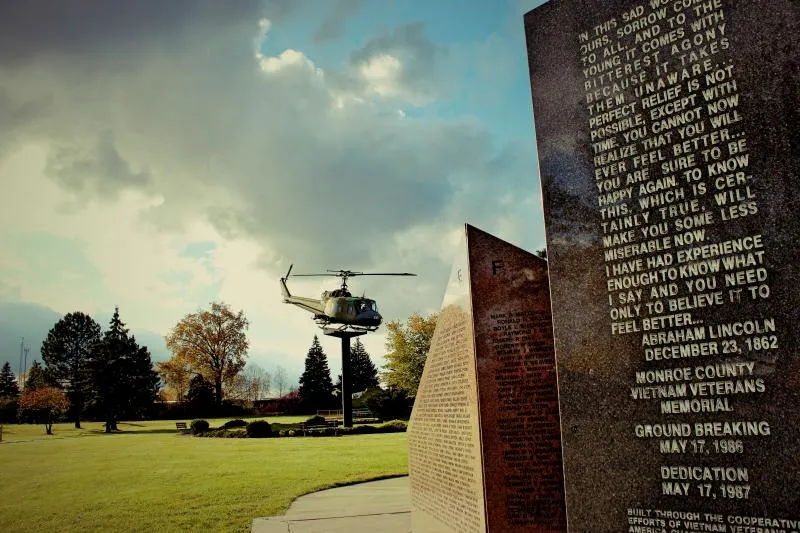
George Armstrong Custer Equestrian Monument
The George Armstrong Custer Equestrian Monument is located at Monroe, MI 48162, United States. It is an equestrian statue of General George Armstrong Custer also known as Sighting the Enemy. Proponents of the statue argue that it commemorates Custer’s spectacular service to the Union during the Civil War and not his failure at the Battle of the Little Big Horn. The statue shows Custer wearing his Civil War uniform. In keeping with sculptural convention, his horse has all four feet on the ground, as Custer did not die during that period of service.
General Custer’s Background
General George Armstrong Custer lived much of his early childhood in Monroe with relatives and attended the schools in Monroe. He met his wife Elizabeth Bacon during his youth, whom he got married to in 1864. Custer left Monroe to attend the United States Military Academy and fight in the Civil War. After the Civil War, he fought in the Indian Wars in the West. His previous accomplishments in the Civil War, however, were overshadowed by his catastrophic defeat and death at the Battle of the Little Big Horn on June 25, 1876.
Know more about the Statue
To honor him, a $24,000, 14-foot (4.27 m) bronze equestrian statue, sculpted by Edward Clark Potter, was unveiled in Monroe in June 1910 by President William Howard Taft and the widowed Elizabeth Bacon Custer. The statue commemorates his successful actions during the Civil War and not his more well-known defeat in 1876. The statue was sculpted by Edward Clark Potter and it was designated as a Michigan Historic Site on June 15, 1992 and soon after listed on the National Register of Historic Places on December 9, 1994.
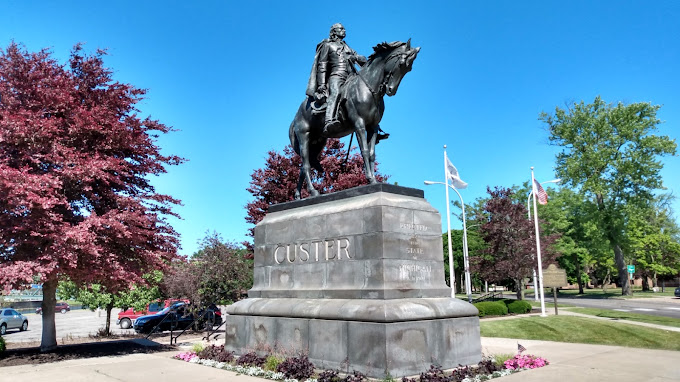
River Raisin Centre For The Arts
River Raisin Centre For The Arts is located at 114 S Monroe St, Monroe, MI 48161, United States. It offers a variety of services to the community including music lessons, dance and ballet lessons and stage entertainment. It was originally a movie theater that the community has converted into a nice theater for stage and other uses. The River Raisin Centre for the Arts is the premier regional center for unparalleled performing arts education and programming that instructs, inspires and enriches Monroe County and the surrounding communities. It is an Historic Authentic Monroe County Downtown Theater that features educational programs in the performing arts and a full season of high quality entertainment. Numerous dance classes and theater arts camps, musicals, holiday shows and much more are hosted in the theater. The theater is available for rental as well. This delightful 900 seat Art Deco theater is the community’s “Centre of Attention. The car park, entrance, seatings and toilets are all wheelchair accessible.
Get acquainted with the River Raisin Ballet Academy
The River Raisin Ballet Academy was originally formed in 2001 as a special performance curriculum option for the River Raisin Dance Academy. After several successful seasons, the company was reorganized as a separate resident company of the River Raisin Center For The Arts, a non-profit organization. The River Raisin Ballet Academy holds open auditions each year for serious-minded ballet students. The classical ballet training offered at the River Raisin Center For The Arts Dance Academy continues to provide a stepping stone for the ballet academy members. The discipline, elegance, and achievement of the ballet academy have been well noted throughout the Monroe county area.
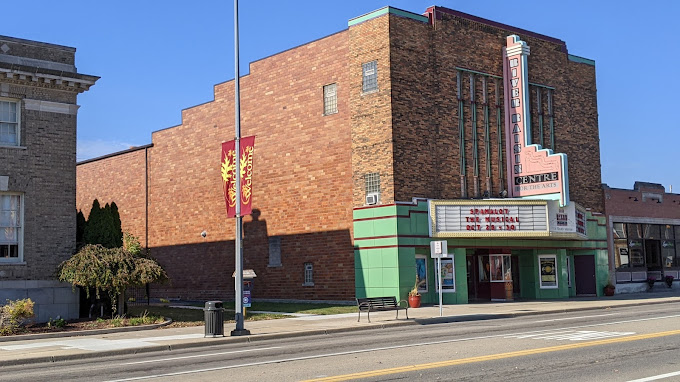
Next place of interest: Monroe Farmers Market
Return to the main Monroe MI page
